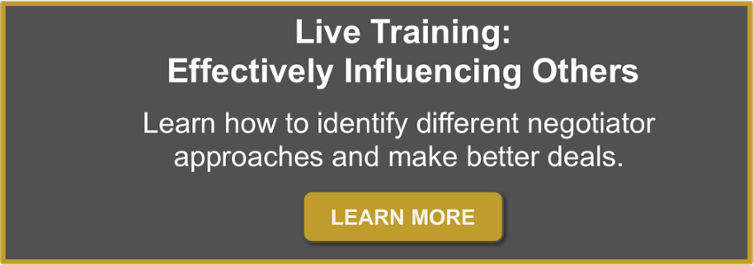 Whether or not you realize it we have all used “tell me more” when questioning someone about a topic we want to know more about. More often than not our intentions are inquisitive and open-ended but we forget that the simplest definition of an open-ended question is one that cannot be answered with a “yes” or “no”. Unfortunately at times our desire to know more gets in the way of the mission to be collaborative.
Whether or not you realize it we have all used “tell me more” when questioning someone about a topic we want to know more about. More often than not our intentions are inquisitive and open-ended but we forget that the simplest definition of an open-ended question is one that cannot be answered with a “yes” or “no”. Unfortunately at times our desire to know more gets in the way of the mission to be collaborative.
The real problem with “Tell me more” questions is that it is not actually a question. The curiosity or genuine concern that goes hand in hand with questioning someone may be the motivation for using “Tell me more”, but it is poor execution. If you are playing soccer and you try to get the ball in the net by picking it up and throwing it you would get a penalty. Throwing the ball doesn’t change the fact that you were trying to score a goal and win the game your execution was poor. The fact of the matter is “tell me more” is a command. Additionally if you take that line with someone you are negotiating with and they look at you and say “no”, where does that leave you?
One of the real keys to the agreement of terms is to turn your counterpart into your problem solver.
Now if you are conversing with someone you are familiar with and it is a very general conversation, using this phase is harmless. Maybe you are talking to your girlfriend about a hot date she had and you need the “deets” like yesterday, it’s harmless and probably somewhat expected. But as we all know negotiation is about influencing behavior and decision-making. One of the real keys to the agreement of terms is to turn your counterpart into your problem solver. Just based on human nature reaction people do not think things through when they are commanded. Calibrated questions in combination with labels are a great way to not only encourage the sharing of information but also put you in a perfect place to compare ideas in your counterparts thinking that can lead to them seeing the solution to a problem the same way you do.
In conclusion be careful of demanding the person on the other-side share information with you. Have you ever used “tell me more” with your boss? Negotiation is all about influencing behavior, and a key to influencing behavior is giving the illusion of control. People are naturally less collaborative when they feel they are not part of or have any say in a solution. Exhibiting dominance with commands for information only hinders our ability to move forward as a unit at the negotiation table. Never forget negotiation is a team sport.

